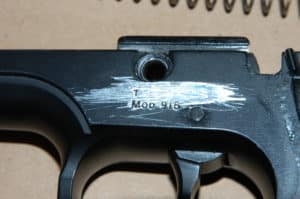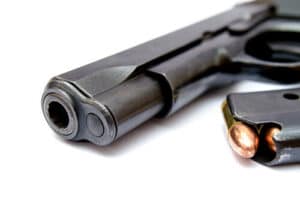Weapons Charges Defense Attorneys with Offices in Essex County, New Jersey

Defaced Firearms in New Jersey
Definition of a Defaced Firearm
According to section N.J.S.A. 2C:39-1, which includes definitions of critical terms related to New Jersey Weapons Law, “deface” means to remove, deface, cover, alter, or destroy the name of the maker, model designation, manufacturer’s serial number or any other distinguishing identification mark or number on any firearm.
Serial numbers are unique identifiers, and for firearms, they are issued by the manufacturers and not government agencies. There are multiple reasons why serial numbers exist on firearms and are important in the United States. The first reason is to prevent counterfeit, or fraudulent, firearms from being bought and sold in the United States. This is mainly why manufacturers issue serial numbers. Secondary reasons, however, can be more helpful to law enforcement. Serial numbers are also able to tell law enforcement who the actual owner of the firearm is. They can also help to locate weapons in the United States and even connect guns to their owners when police are investigating crimes.
The serial numbers on firearms are usually located on the firearm’s handle, slide, trigger guard or receiver. Other key information on the firearm includes where the firearm was made, when it was made, the type of firearm, and who manufactured the firearm. None of this information can be concealed, removed, filed off, or stripped from the firearm. Doing so is a violation of New Jersey law, as is possessing a defaced gun.
Possession of a Defaced Firearm
In New Jersey, it is unlawful to possess a defaced firearm. Possession of a defaced firearm is considered a violation of N.J.S.A. 2C:39-3, which addresses Prohibited Weapons and Devices. A violation of this section is classified as a fourth degree crime when the offense involves a defaced firearm. As such, a conviction may result in a sentence to serve up to 18 months in New Jersey State Prison. This crime is also subject to mandatory minimum sentencing requirements under the Graves Act, which requires those convicted of fourth degree gun crimes to serve 18 months in prison before reaching parole eligibility.
The state has three main elements that they have to prove when charging someone with this crime. First, they must show that the firearm in question is actually a firearm as it is defined in the statute. Second, they must show that the firearm was actually defaced as it is defined in the statute, meaning that the serial number was altered, removed, destroyed, or covered in some way. Third, the state must prove that you knowingly possessed the alleged firearm, meaning you were aware that you had control over the firearm.
Defacing a Firearm and Other Offenses
As outlined in section N.J.S.A. 2C:39-9, it is also illegal to deface a firearm in New Jersey. According to this law, “Any person who defaces any firearm is guilty of a crime of the third degree.” Third degree crimes entail a prison sentence ranging from 3 to 5 years. This offense is also governed by the Graves Act, which mandates that convicted offenders of first, second, and third degree crimes serve one-half of their sentence or 42 months, the longer of the two being required, before being considered for parole.
New Jersey also prohibits buying, receiving, disposing of, or concealing a defaced firearm. Under N.J.S.A. 2C:39-9, any of the aforementioned acts is considered a fourth degree crime, punishable by a maximum term of incarceration of 18 months.
Common Reasons Why People are Charged with Defaced Firearms
Defaced firearms are very common on the black market for a number of reasons, but mainly because of supply and demand. If a firearm is defaced, it usually means that it is stolen, or has been involved in a crime. If that is the case, those who possess such a gun may be driven to provide the firearm to someone else as quickly as possible. People buy defaced weapons, usually because the firearm is considered to be untraceable. Either way, individuals may deface firearms because they do not want the firearm to be traced to a particular crime, location, or person.

However, many people also come across defaced firearms inadvertently. There are several ways someone can inadvertently come across a defaced firearm. Many times, these guns can be left as an inheritance to someone from a relative. In addition, though prohibited from selling defaced weapons, licensed firearms dealers and others may sell the weapons. Even though it is illegal, it still happens and the purchaser of the gun is sometimes unaware that the firearm is considered defaced. Lastly, if someone sends their firearm to get cleaned or refinished by a gunsmith, it is possible that the serial number was rubbed off with a file in the process of refinishing the firearm.
There are some firearms that one may acquire that may have serial numbers that are defaced which can subject the owner or one in possession of such a firearm to criminal penalty even if the person in possession of the defaced firearm did not actually deface the firearm. This is the case even if the firearm was otherwise lawfully obtained. Check your firearms closely, especially the serial number. Once you realize the firearm you are in possession of has a defaced firearm, you need to take the appropriate legal steps to get rid of it otherwise risk facing criminal penalty. The fact that you never used a defaced firearm is not a defense to possession.
Ways to Beat Defaced Firearm Charges
A somewhat popular and successful defense to a defaced firearm charge is that the concealment of the serial number on the firearm is due to normal wear and tear. However, there is a lengthy list of procedural defenses that may be viable when facing a charge like this. These defenses include illegal searches, illegal seizures, failing to provide Miranda rights before interrogation, improper suspect line-ups, false or impeachable evidence, bias, or even chain of custody issues.
Contact our Newark Defaced Gun Attorneys for a Free Consultation
When faced with a charge as serious as possession of a defaced weapon or defacing a gun in New Jersey, it is crucial to retain an attorney that is experienced in gun defense. Our talented team of NJ gun lawyers has not only handled charges such as possession of a defaced weapon, but many others such as possession and manufacturing of ghost guns, charges for hollow-point bullets, and even weapons trafficking cases that cross state lines. We are highly attuned to all of the procedural issues that may arise in the prosecution’s case against you, as well as the impact on sentencing that minor details may play. Our weapons defense attorneys know exactly what is important in order to maintain your freedom before, during, and after the trial is over. No matter where you were charged with a defaced firearm in New Jersey, whether it be Ocean County, Monmouth County, Union County, Bergen County, Hudson County, Passaic County, or another county, our gun defense attorneys will do everything in our power to ensure the case ends with a favorable outcome.
